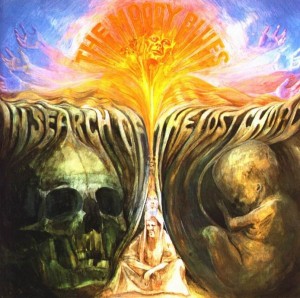In Search of…

In Search of the Lost Chord
…the Big Bang, Schrödinger’s Cat, Bacchus (the god of wine), excellence, or – dare I say it – the Lost Chord! When I was a kid, the reason I liked The Moody Blues was simple; like most other kids they were in search of something (supposedly themselves). In the case of this album, In Search of the Lost Chord, several of the songs are about the search for spiritual fulfillment. Ostensibly the search is for the lost chord, and in the cut The Word, that chord has a name and it’s found at the end of the poem… which introduces the next song – Om. Um, ok, if we accept this Hindu thingy then we’ve found the source of all, um, well language and science and, um, well… everything! KEWL! But really, we know it can’t quite be true because The Moody Blues kept searching… for something, er, um, truth?
Doesn’t matter, I still love that album and am a fan of the band. Let’s face it though, like many modern people – especially in the west – the band was more concerned with the SEARCH for the truth rather than finding and holding her close. Why bother with The Moody Blues? Well… it’s all about citizenship! More to the point I suppose, it is about the certainties I spoke of in my post Bothering with Citizenship. I’ve addressed the notion of facts being real and independent of our persons, but the postmodernists of many different flavors would strongly disagree with me – because they are certain that there is no privileged point of view.
I’m trying to keep this short and manageable, but it will be most difficult. On several occasions I’ve addressed several of the problems with the idea that because I “feel it” it must be true. Something I have only addressed indirectly is the idea that the majority determines truth. Ann Marlowe, in a recent article for The Weekly Standard (TWS) entitled Cool Gone Cold, reviewed a book called The Birth (and Death) of Cool by Ted Gioia. At its most basic, according to Marlowe, the book chronicles the notion of “cool” in terms of jazz greats of the early 20th Century. Gioia complains that coolness deteriorated and “eventually boiled down to how one was perceived by others. Coolness, even more than beauty, is inevitably in the eye of the beholder” (TWS 20091109). Rather than quote Marlowe at length for her explanation of Nietzsche’s concept of perspectival thinking (which is excellent), I’ll settle for a quick and effective definition from the Dictionary of Philosophy by Alan Lacey:
Perspectivism: The theory that there can be radically different and incommensurable conceptual schemes or perspectives, one of which we must, consciously or unconsciously, adopt, but none of which is more correct than its rivals.
Marlowe believes that “The idea that reality is whatever it is perceived to be, rather than something with independent existence, is likely to be with us as long as our culture survives. This is a good thing, too” (TWS 20091109). Now, before I reveal why she believes this to be a good thing, let me mention a small bit of commentary from another TWS article: All Crisis, All the Time: The American addiction to overreaction by Irwin Savodnik. He first identifies what a legitimate crisis is, and then shows how our “Illegal immigration, farm, credit card, and education crises,” while substantive concerns – are hardly comparable to plague, world wars, etc. Savodnik also reports that American responses to these “substantive concerns” are overreactions that point “to mythical thinking, a way of embodying our emotions and impulses in tales of our fears, vulnerabilities, and guilt in strange, often colorful, stories” (TWS 20091102). Seriously, is the Chrysler crisis going to be resolved with a government designed vehicle?
Why does Marlowe believe that reality is whatever it is perceived to be a good thing? It’s worth an extended quotation here:
The radical subjectivism which gave birth to contemporary art and to counterinsurgency theory has also given us cultural relativism and a loss of confidence in Western values. But the skepticism inherent in perspectival culture will not be the destruction, but the saving, of Western civilization. Poseurs and, especially, their commercialization may be annoying, but they don’t blow up airplanes or commit suicide bombings. It takes a belief in the objective reality of one’s beliefs to produce fanaticism. (TWS 20091109)
Really? Take a short tour through the late sixties and seventies to notice that Marxist and other groups that were incredibly influenced by Nietzsche’s perspectivist perspective maimed, killed, and bombed scores of innocents. In August of 1970 – the Sterling Hall bombing. In 1971, the Black Liberation Army, a socialist group kills three police officers. In October of 1971 the Post Office Tower of London was bombed by the IRA. The IRA, Red Brigade, ETA, FALN were/are all left groups with perspectivist systems of belief. Although many of these groups demonstrate that subjective beliefs produced fanaticism, ultimately, these groups with shared perspectives on reality (defined in terms of their perceptions) are mere “quibbles” in this debate.
If the only real thing Marlowe is certain of is that there are no certainties, then it makes this kind of discussion virtually meaningless. On the other hand, we could pretend to believe what she seems to be implying here – that, like psychology, normalcy is defined by the majority. If reality is whatever it is perceived to be, then the majority view would tend to define reality… which won’t be the perspectivist “view” because they’ve lost confidence in their own Western values.
I hope we haven’t lost confidence in our Western values. I hope we stop overreacting to things that are not crises. I would equate Marlowe’s “radical subjectivism” to what Savodnik calls “mythical thinking.” It is:
…a way of embodying our emotions and impulses in tales of our fears, vulnerabilities, and guilt in strange, often colorful, stories. We dread our powerlessness and concoct magical cures for our weakness. Such thinking is regressive. That myths are the outcome of the flight from reality, that we hop from one myth to the other and supplant reason with emotion, tells us that we have regressed. We’ve chosen ways of thinking found in children, tribal cultures, and dreams.
There is a moral dimension to all this. We are not children anymore. We are not mere mythmakers. We know fairy tales don’t solve the problems that plague us. We have a choice between thinking in Dr. Seuss terms, and in reflective adult ways. When we don’t acknowledge this internal dichotomy, we are acting in bad faith. (TWS 20091102)
I wonder why so many are “going Galt?” Let’s find our certainties.
Cheers to all!



 I suppose I could multiply quotes concerning the nature of politics, but the first one will do with one caveat, and that is “Politics is the acquisition, exercise, distribution, and maintenance of power.” While it should be wise, that is more wish than fact. P.J. O’Rourke’s definition, on the other hand, serves fine as is 😉 I’ve already written about my take on the nature of
I suppose I could multiply quotes concerning the nature of politics, but the first one will do with one caveat, and that is “Politics is the acquisition, exercise, distribution, and maintenance of power.” While it should be wise, that is more wish than fact. P.J. O’Rourke’s definition, on the other hand, serves fine as is 😉 I’ve already written about my take on the nature of  I’ve been reading bits, blogs, and books on writing again. Thanks in part to a vacation I picked up my journal again – for more than cursory entries – and gave it a serious working out. Another part I owe some thanks to is Jeff, an online buddy over at
I’ve been reading bits, blogs, and books on writing again. Thanks in part to a vacation I picked up my journal again – for more than cursory entries – and gave it a serious working out. Another part I owe some thanks to is Jeff, an online buddy over at  That isn’t a far jump to Jeff’s closing paragraph concerning self-indulgence: “I would suppose the answer is that it’s self-indulgent, yes. But not irresponsibly so since if even one person feels a kinship by reading the story, I’ve bestowed a boon” (MNR 20091024). Whether the boon is poetry or prose or both, it will have been a shame to fail to shout in the shower those most primitive sounds we make when alone in those reckless moments that trigger our hearts to sing sentences – which maybe only the person in the shower will ever hear. Like Hugo, I hope your “truth conforms to the music” and we meet to hear it.
That isn’t a far jump to Jeff’s closing paragraph concerning self-indulgence: “I would suppose the answer is that it’s self-indulgent, yes. But not irresponsibly so since if even one person feels a kinship by reading the story, I’ve bestowed a boon” (MNR 20091024). Whether the boon is poetry or prose or both, it will have been a shame to fail to shout in the shower those most primitive sounds we make when alone in those reckless moments that trigger our hearts to sing sentences – which maybe only the person in the shower will ever hear. Like Hugo, I hope your “truth conforms to the music” and we meet to hear it.






